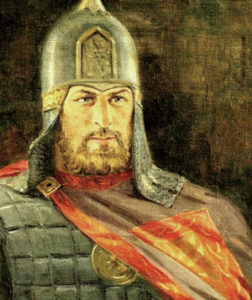(1252 – 1263)

Alexander Yaroslavich Nevsky, son of Yaroslav II Vsevolodovich, belonged to a number of remarkable rulers of the Russian land. He followed the wise policy of his father, during his lifetime, reigned in Novgorod.
At this time, Novgorod was threatened by the Swedes, and Pskov – Germans and Lithuanians. At the head of the Swedish army was the famous commander Birger, the founder of the city of Stockholm.
The Swedes marched on the order of the Roman Pope on a crusade against the Finnish and neighboring lands of Novgorod to conquer them and introduce Catholicism.
In 1240 Alexander Yaroslavich defeated the Swedes on the banks of the Neva. For this victory and received the nickname of Nevsky.
In 1242, he won the ice of the Peipsi Lake (the Battle of the Ice) over the Livonian knights, who at the beginning of the 13th century settled along the Western Dvina and in 1201 founded the city of Riga.
Thus Alexander Nevsky saved the Russian land from German domination and Catholicism. Three times it reflected the attacks of Lithuanians.
Defeating the Western enemies – the Swedes, Germans and Lithuanians, Alexander completely differently kept himself in relation to the Tatars.
In 1252, Alexander established himself on the Grand Prince’s throne of Vladimir. He considered full submission to the Khan the only way to save the fatherland, and therefore went to the horde with rich gifts, showing unconditional obedience to the will of the khan and urging others to obey too.
Alexander persuaded the Novgorodians to agree to a full census, which the new Khan Berke (brother of Batu) ordered to spend to determine the size of the tribute. But when the inhabitants of Rostov, Suzdal, Vladimir, Yaroslavl, outraged by the oppression of the Tatar Baskakov, killed them, Alexander for the 4th time went to the horde to ask them for mercy from the Khan. The goal was achieved, but on the way back to Vladimir he died.
Alexander Nevsky was an outstanding statesman and commander. The church is ranked among the saints.